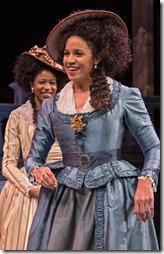
Despite gorgeous visuals, 'Love' is lacking
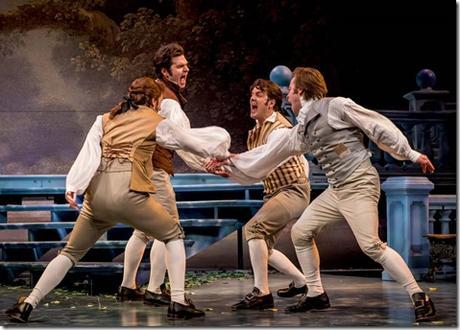
Review by Catey Sullivan
Love's Labor's Lost is decidedly lesser Shakespeare. Within its rambling plot you can catch glimpses of far superior plays. The puritanical nonsense of , the mischievous token-exchange trickery of All's Well That Ends Well, the romantically inclined rustics of , the play-within-the-play of A Midsummer Night's Dream - all these devices show up in Love's Labor's Lost . Unfortunately, they are deployed in the service of a comedy that plays like a 20-minute comic sketch unwisely bloated into a 150-minute slog.
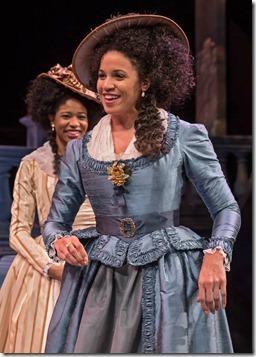
But more than visuals are required to pull off a compelling comedy. And beyond its lavish looks, Love's Labor's Lost is lacking. The problem sits squarely in the text, and the underdeveloped characters therein. It's purportedly a love story, although nobody in the story is ever believably in love. The men who supposedly fall under Cupid's arrow are all versions of Romeo, pre-Juliet. That's the Romeo who declared slavish, eternal devotion to a woman named Rosaline, swearing he would die without her. Less than 12 hours later, he'd forgotten Rosaline existed. Point being: Before Juliet, Romeo wasn't really in love. He was besotted with the idea of being in love. So it is with the four young men of Navarre in Love's Labor's Lost .
The plot kicks off as the King of Navarre (Jonathan Tufts) and his bro-some university chums Berowne (Nate Burger), Longaville (Madison Niederhauser) and Dumaine (Julian Hester) sign an oath to forswear feasting, women and sleeping for more than three hours a night. In a gruesome declaration of misogyny, the boys further proclaim that any woman who comes within a mile of the court will have her tongue removed. Berowne spars a bit with the King over the wisdom of the oath, but signs after some extensive banter.
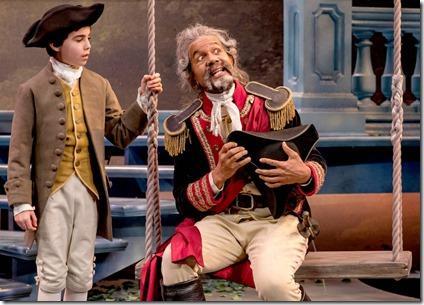
Complications ensue when the Princess of France (Jennie Greenberry) and her attendants (Laura Rook, Taylor Blim, Jennifer Latimore) arrive on previously scheduled state business, a visit the King apparently forgot about. The ladies are put up in a field some distance from the palace, but the Navarrian men nonetheless fall in love. Or something. Hijinks abound as the King and co. struggle to reconcile their pledge of abstinence with their hearts' desires.
In contrast to the puritanical court, Shakespeare inserts Costard, a randy shepherd (Alex Goodrich), and Jaquenetta, a flirty shepherdess (Maggie Portman) into the story. There is also an over-the-top Spaniard (Allen Gilmore) who travels with a diminutive page (Aaron Lamm), a fussy-faced schoolmaster (Mario Guzman), a prim priest (Greg Vinkler) and a verbally-challenged constable (Steven Pringle) whose actions are so extraneous to the plot that it seems like they've wandered in from another play. The same can be said of the lengthy play-within-the-play involving Greek mythology.
Maraden gets fine performances from her cast. Tufts is amiably bland as the aspiring acetic King of Navarre. Berger's Berowne is an adequate foil who briefly tries to exert a voice of reason over the oath business.
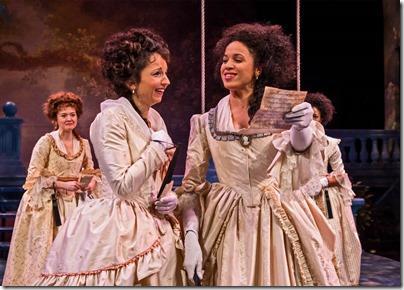
The most interesting characters, however, are the rustics. Goodrich's not-nearly-as-dumb-as-he-looks shepherd is a comic delight. With expertly deployed timing and a quick-witted mastery of Shakespeare's language, Goodrich rather makes one wish Costard were starring in his own play. Gilmore goes big with Don Armado, creating a florid Spaniard peacock who is a most engaging buffoon.
Led by Greenberry's noble, elegant Princess of France, the courtly ladies of Love's Labor's Lost are as lovely as a bouquet of flowers. But it's Portman's Jaquenetta who makes the most lasting impression. The country lass is an endearingly vivacious sexpot whose flirtatious warmth lights up the stage.
If the plot of Love's Labor's Lost is a piffle, the ending is utterly incongruous with all that's come before. The play goes from foam-light comedy to dark, deadly serious drama in the space of single sentence. Unlike most of Shakespeare's other comedies, things end on a funereal note rather than a matrimonial one. The final, sober procession is as abrupt as someone flipping a light switch.
Maraden does as well as anyone could with Love's Labor's Lost . If nothing else, the production will make you want to hit up the Romantic/Impressionistic collection wing of the Art Institute.
Love's Labor's Lost continues through March 26th at Chicago Shakespeare, 800 E. Grand, Navy Pier (map), with performances Wednesdays and Thursdays 1:30 & 7:30pm, Fridays 7:30pm, Saturdays 3pm & 8pm, Sundays 2pm & 6:30pm. Tickets are $48-$88, and are available by phone (312-595-5600) or online through their website (check for half-price tickets at Goldstar.com ). More information at ChicagoShakes.com. (Running time: 2 hours 30 minutes, includes an intermission)
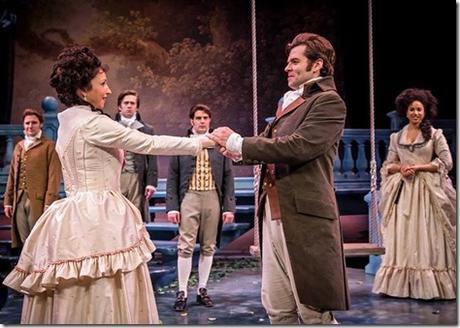
Photos by Liz Lauren
behind the scenes
Marti Maraden (director), Kevin Depinet (scenic design), Christina Poddubiuk (costume design), Greg Hofmann (lighting design), Keith Thomas (sound design, original music), Richard Jarvie (wig master), Matthew Raftery (choreographer), Larry Yando (verse coach), Elizabeth Swanson (assistant director), Deborah Acker (production stage manager), Victoria Whooper (asst. stage manager), Bob Mason (artistic associate, casting director), Rick Boynton (creative producer), Barbara Gaines (artistic director), Criss Henderson (executive director), Liz Lauren (photography)
Tags: 17-0216, Aaron Lamm, Alex Goodrich, Allen Gilmore, Barbara Gaines, Bob Mason, Catey Sullivan, Chicago Shakespeare Theater, Chicago Theater, Christina Poddubiuk, Criss Henderson, Deborah Acker, Elizabeth Swanson, Greg Hofmann, Greg Vinkler, James Newcomb, Jennie Greenberry, Jennifer Latimore, Jonathan Tufts, Julian Hester, Keith Thomas, Kevin Depinet, Larry Yando, Laura Rook, Liz Lauren, Madison Niederhauser, Maggie Portman, Manny Buckley, Mario Guzman, Marti Maraden, Matthew Raftery, Nate Burger, Navy Pier, Pierre-Auguste Cot, post, Richard Jarvie, Rick Boynton, Steven Pringle, Taylor Blim, Victoria Whooper, William Shakespeare
Category: 2017 Reviews, Catey Sullivan, Chicago Shakespeare, Navy Pier, Video, William Shakespeare, YouTube

